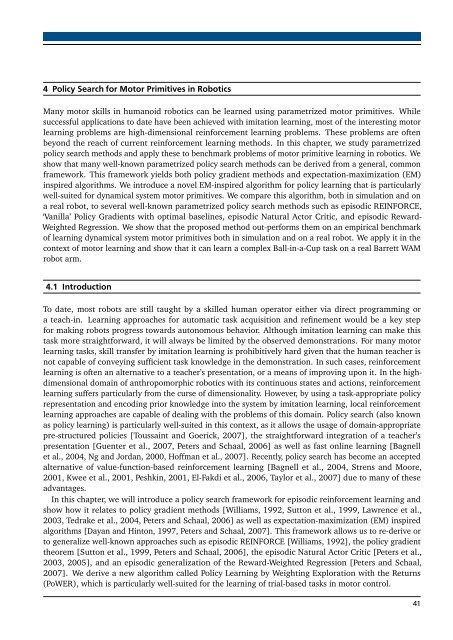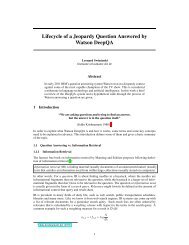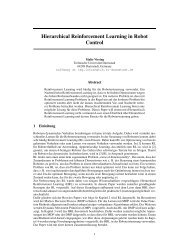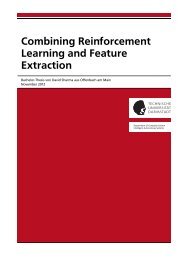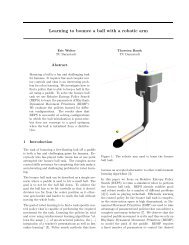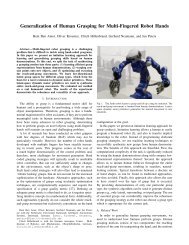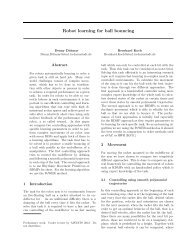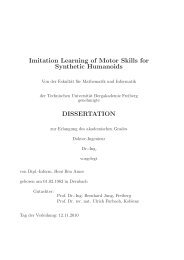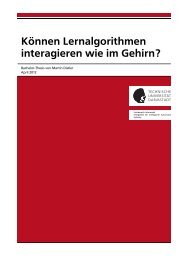Learning Motor Skills - Intelligent Autonomous Systems
Learning Motor Skills - Intelligent Autonomous Systems
Learning Motor Skills - Intelligent Autonomous Systems
You also want an ePaper? Increase the reach of your titles
YUMPU automatically turns print PDFs into web optimized ePapers that Google loves.
4 Policy Search for <strong>Motor</strong> Primitives in Robotics<br />
Many motor skills in humanoid robotics can be learned using parametrized motor primitives. While<br />
successful applications to date have been achieved with imitation learning, most of the interesting motor<br />
learning problems are high-dimensional reinforcement learning problems. These problems are often<br />
beyond the reach of current reinforcement learning methods. In this chapter, we study parametrized<br />
policy search methods and apply these to benchmark problems of motor primitive learning in robotics. We<br />
show that many well-known parametrized policy search methods can be derived from a general, common<br />
framework. This framework yields both policy gradient methods and expectation-maximization (EM)<br />
inspired algorithms. We introduce a novel EM-inspired algorithm for policy learning that is particularly<br />
well-suited for dynamical system motor primitives. We compare this algorithm, both in simulation and on<br />
a real robot, to several well-known parametrized policy search methods such as episodic REINFORCE,<br />
‘Vanilla’ Policy Gradients with optimal baselines, episodic Natural Actor Critic, and episodic Reward-<br />
Weighted Regression. We show that the proposed method out-performs them on an empirical benchmark<br />
of learning dynamical system motor primitives both in simulation and on a real robot. We apply it in the<br />
context of motor learning and show that it can learn a complex Ball-in-a-Cup task on a real Barrett WAM<br />
robot arm.<br />
4.1 Introduction<br />
To date, most robots are still taught by a skilled human operator either via direct programming or<br />
a teach-in. <strong>Learning</strong> approaches for automatic task acquisition and refinement would be a key step<br />
for making robots progress towards autonomous behavior. Although imitation learning can make this<br />
task more straightforward, it will always be limited by the observed demonstrations. For many motor<br />
learning tasks, skill transfer by imitation learning is prohibitively hard given that the human teacher is<br />
not capable of conveying sufficient task knowledge in the demonstration. In such cases, reinforcement<br />
learning is often an alternative to a teacher’s presentation, or a means of improving upon it. In the highdimensional<br />
domain of anthropomorphic robotics with its continuous states and actions, reinforcement<br />
learning suffers particularly from the curse of dimensionality. However, by using a task-appropriate policy<br />
representation and encoding prior knowledge into the system by imitation learning, local reinforcement<br />
learning approaches are capable of dealing with the problems of this domain. Policy search (also known<br />
as policy learning) is particularly well-suited in this context, as it allows the usage of domain-appropriate<br />
pre-structured policies [Toussaint and Goerick, 2007], the straightforward integration of a teacher’s<br />
presentation [Guenter et al., 2007, Peters and Schaal, 2006] as well as fast online learning [Bagnell<br />
et al., 2004, Ng and Jordan, 2000, Hoffman et al., 2007]. Recently, policy search has become an accepted<br />
alternative of value-function-based reinforcement learning [Bagnell et al., 2004, Strens and Moore,<br />
2001, Kwee et al., 2001, Peshkin, 2001, El-Fakdi et al., 2006, Taylor et al., 2007] due to many of these<br />
advantages.<br />
In this chapter, we will introduce a policy search framework for episodic reinforcement learning and<br />
show how it relates to policy gradient methods [Williams, 1992, Sutton et al., 1999, Lawrence et al.,<br />
2003, Tedrake et al., 2004, Peters and Schaal, 2006] as well as expectation-maximization (EM) inspired<br />
algorithms [Dayan and Hinton, 1997, Peters and Schaal, 2007]. This framework allows us to re-derive or<br />
to generalize well-known approaches such as episodic REINFORCE [Williams, 1992], the policy gradient<br />
theorem [Sutton et al., 1999, Peters and Schaal, 2006], the episodic Natural Actor Critic [Peters et al.,<br />
2003, 2005], and an episodic generalization of the Reward-Weighted Regression [Peters and Schaal,<br />
2007]. We derive a new algorithm called Policy <strong>Learning</strong> by Weighting Exploration with the Returns<br />
(PoWER), which is particularly well-suited for the learning of trial-based tasks in motor control.<br />
41


